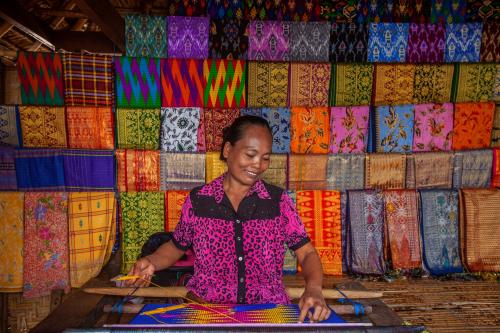

12:00 pm EDT - 1:30 pm EDT
Past Event
The narrative that technological innovation and “digital disruption” can spur economic growth in Africa is persuasive—especially through the success stories of mobile money, as well as agricultural extension and health services supported by mobile devices. However, challenges to faster delivery of technological innovations include basic infrastructures (such as roads and power), educational quality—especially in STEM (science, technology, engineering, and mathematics) subjects—and a conducive regulatory environment. How might donors and governments separately and together support entrepreneurs? How might the African workforce be empowered to contribute to the Fourth Industrial Revolution? What are the factors that will attract investors to African technological innovations?
On Monday, March 12, the Brookings Institution and the Congressional African Staff Association (CASA) hosted an Africa policy dialogue on Capitol Hill in order to discuss the ways through which Africa can leverage the technological revolution to spur economic growth. The discussion also touched on the startup ecosystem in Africa. Landry Signé, a David M. Rubenstein Fellow at the African Growth Initiative, gave opening remarks and moderated the discussion. Panelists included Rose Chan, founder of therefore and former digital economist at the World Bank; Steven Koltai, Brookings nonresident fellow and managing director of Koltai & Company; and Leslie Tita, co-founder of I/O Spaces. In the introduction, Signé discussed the critical role of technological innovation in fostering African economic growth since 2000, as the continent has been home of at least half of the world’s fastest growing economies. For example, he cited that Africa, which had less mobile phone subscribers in the 1990s than the state of New York, presently has more than three-quarters of a billion sim connections. The number of sim connections is projected to rise to a billion in the early 2020s, thus illustrating the burgeoning technological revolution across the continent, with successful digital transformation success stories (money, health, education, etc.).
Chan started the discussion by stating that African countries will get further and further behind if they fail to catch up with technological advancement. Moreover, while digital and technological cannot be treated separately, the future of economic growth lies in the digital future. Chan cited the following challenges: connectivity and education. She believes that solving the two challenges should be part of countries’ economic policies. Presently, there is a gap between policy formulation and work on the ground. The role of the government is twofold: It must ensure stability but also allow for testing. Moreover, the government should intervene where the market has failed to provide an optimal outcome. One way of intervention is through increasing government’s use of technology, which would increase individual business’ confidence in technology. This is seen in countries such as Singapore.
Steven Koltai adds that one of the key challenges with entrepreneurship in Africa is around capital mobilization. Last year, Africa collected $350 million in venture capital. This is comparable to the venture capital generated in the Metropolitan area of Washington, D.C.. Nevertheless, while African entrepreneurs lament the lack of venture capital, Koltai states that this issue is seen worldwide. In the U.S., only 7 percent of startups get venture capital funding. There also exists a lack of commercial funding for both American and African startups. Koltai stated that the real problem for Africa is the lack of investment-worthy projects. To remedy this issue, he described a mentoring program he initiated where companies had to meet two eligibility criteria: They had to be generating revenue and must have been attracting capital from an unrelated source (non-family members). The project attracted new capital to the mentored companies. Koltai proposes mentoring as a solution to the lack of investible African startups.
In his remarks, Leslie Tita stated that many American investors have no idea how Africa works. They often enter the continent with a Silicon Valley mentality, which does not work. Such mentality drives investors to push for equity, which does not mean much in Africa, where most entrepreneurs are trying to stay afloat, and build up revenue streams. Moreover, the startup ecosystem in Africa is relatively young and returns are not immediate. As far as investing is concerned, Tita believes that co-working spacing are good places to invest in. Additionally, some of the most interesting startup innovations are local ones centered on local communities’ need.
Signé asked the question of how donors, investors, and governments can work together and separately to promote entrepreneurs, facilitate technological innovation, and shape the Fourth Industrial Revolution. The panelists responded that there is no one-size-fits-all approach. There is no single policy action to energize entrepreneurship ecosystem building. Koltai offers the six +six approach where multiple activities (identify, train, connect and sustain, fund, enable public policy, and celebrate entrepreneurs) and actors (NGOs, foundations, academia, investors, government, and corporations) work hand in hand to develop a supportive environment for entrepreneurship. In addition, instead of innovating, actors should work toward supporting countries’ existing ecosystems. The role of the government is also engrained in providing the basis upon which a strong startup ecosystem can be built. For instance, Kigali’s city-wide Wi-Fi is strongly enabled by the government. Training is another area in which government intervention can be beneficial to a country’s startup ecosystem, as companies often have to hire and train employees.
Signé also asked about factors that will attract investors and foster technological innovation. Panelists agreed that the government has a big part to play. In Rwanda, the government takes an active role in providing infrastructure and some level on insurance for the investor. For instance, if government themselves are investing, this creates confidence from others. In addition, African companies need to look beyond the vicinity of their own countries. It is possible to based in Burundi and invest in Tunisia.
In conclusion, it is important to create companies that offer highly profitable returns with exits to investors. Chan states that what happened in Silicon Valley–large scale capital investment—will not happen in Africa, as there are other priorities, such as basic needs. We need to look at innovative low-cost ways of innovating and avoid replicating other regions’ work. For instance, a lot of technological in the first world was invented to be capital intensive. Africa should look toward exercising its comparative advantage: labor. Tita added that, while there are other priorities in Africa, we can look both at the need for water and food and entrepreneurship. He also states that patience is key, as “a lot of our work, will not benefit us in our lifetime. We are working for future generations.”

George Ingram, Junjie Ren
March 7, 2025

Ben Kereopa-Yorke
March 7, 2025

Philip Schellekens, Shahid Yusuf
March 7, 2025